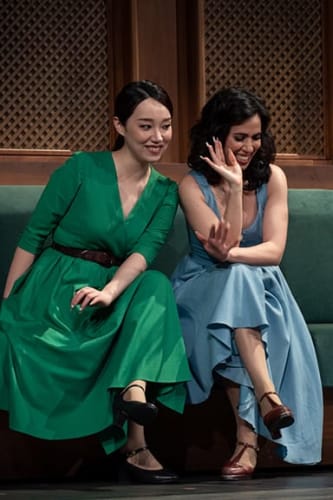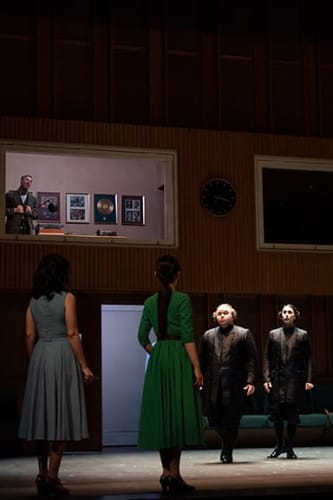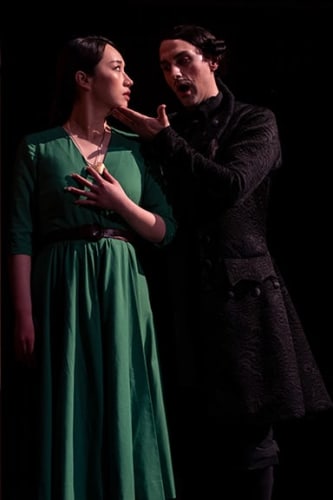The world that Da Ponte and Mozart created in one of their greatest operas, Così fan tutte, is one in which loyalties and friends and relationships all shift from moment to moment.
Its title, famously, is often loosely translated “all women are like that,” as if women were the main problem in this opera. It’s actually the women who have the most to lose, and the men egging them on to see if they can get the two sisters into trouble. The fact remains that Ferrando and Guglielmo as sung by Owen McCausland and Christopher Dunham, respectively, agree to take part in a bet offered by Don Alfonso (Phillip Addis): can they play other men than themselves in an effort to trick sisters Hongni Wu (Dorabella) and Lucia Cesaroni (Fiordiligi) into being unfaithful to their lovers by playing the roles of Albanian soldiers looking for love? They certainly do their best.
The world Mozart and Da Ponte have created is, on its original surface, somewhat prosaic, if always amusing. The two couples go through life without much care, no doubt happily on their way to domestic bliss, till Don Alfonso, like a comic Iago or Satan, puts ideas in Ferrando and Guglielmo’s heads. It’s not the women, especially as sung and performed by Wu and Cesaroni, looking for trouble. Nope, they are innocent, till they are tempted to a hilarious fall. Or, rather, they would be in true risk of failing to be faithful if it weren’t for the fact that the two tempters are also their lovers.
But in this co-production between Théâtre des Champs-Elysées, Pacific Opera Victoria, théâtre de Caen, and Tokyo Nikikai Opera Foundation, as presented here by Pacific Opera Victoria, matters are a bit more complex yet, due to Laurent Pelly’s superb direction and costume design. This Così is set, in all places, a 1940s or '50s radio studio. The stage is dark when the performance begins with a bright lit hallway behind the doors to a darkened auditorium: we hear the actors playing the two sisters stumbling into the place they going to perform the opera for a listening audience. The space is full of chairs and old fashioned microphones and the two women playing the sisters enter speaking to each other in English, not in Italian, and wondering where the other performers are. They ask if they are in the right place; it’s only when the lights in the onstage auditorium come up that we see not only a place to sing, but also a control booth complete with a gold record hanging on the wall, sign of a well received and no doubt successfully remunerative record album recorded in that space.
In other words, this world is a liminal world, an analogue and extension of the already imaginary world of the original opera. Here, since the women are singing the two sisters for radio, they are dressed in the street clothes one might see in a production, say, of Kiss Me, Kate’s backstage scenes. The other actors arrive, and as they do, we see them in the same style of costume from the same period.
As the opera goes on, and the two women find themselves more and more entangled in the world created by means of Alfonso’s bet intended to call their characters into question, the two male lovers appear in highly stylised (i.e., fake) “Albanian Soldier Costumes, turn of century” straight from bad operetta. This tension between the costumes worn by Dorabella and Fiordiligi—always from the '50s, placing them squarely in the somewhat real world of radio studio—and those worn by the men and by Despina, performed by a very saucy and fun Cécile Muhire.
The set creates a world of mirrors, especially seen in the glass of the control booth windows and in some of the set pieces; it’s a highly theatrical metaphor which enables and empowers more of the audiences’ gaze. We see both the front and backs of characters and see them watching each other. We see what otherwise we might not and we end up seeing the two women vindicated because for all their infidelity, after all, they fell in love with the same two men all over again for a second and final happy ending, one buoyed up by the perfect Mozartean voices and the excellent work of the Pacific Opera Chorus and Supernumeraries and the Victoria Symphony as conducted by Timothy Vernon.
The production is a lovely and magical landscape in which it may be true that women can be like that, but also that all’s well by the time the final bow is taken and the orchestra puts away its instruments.


